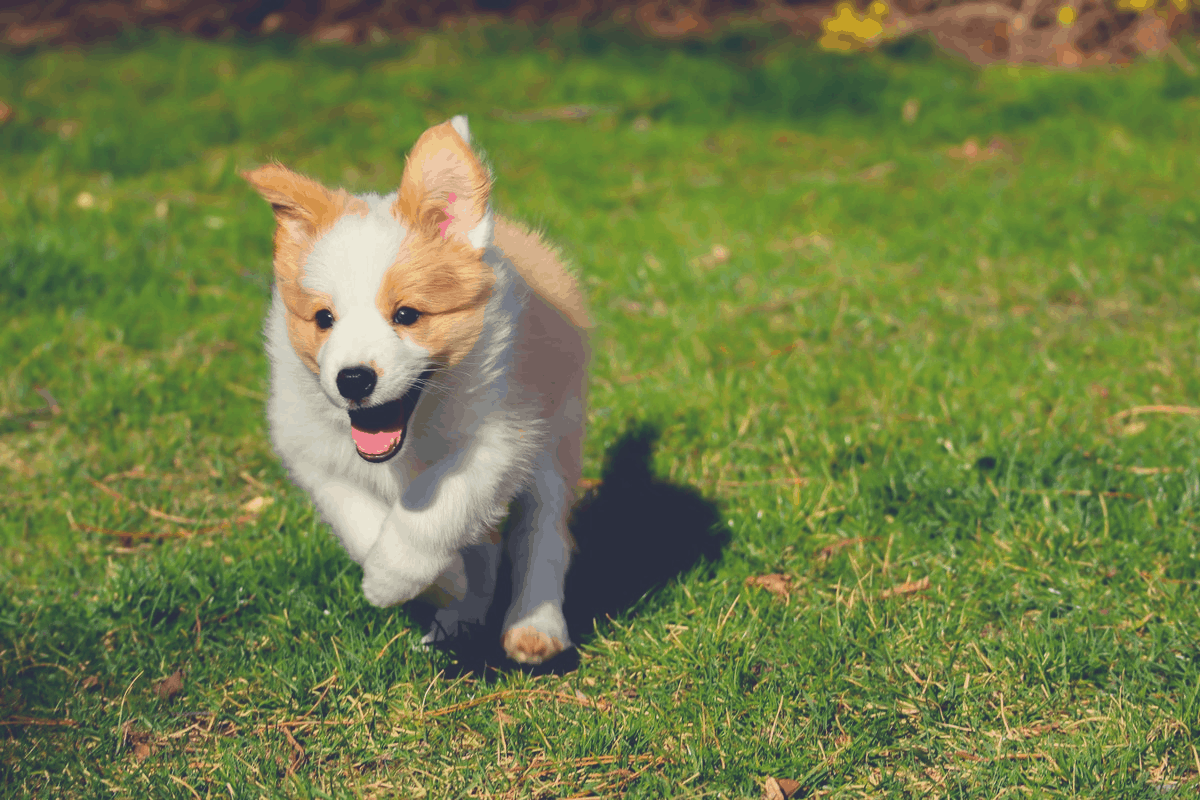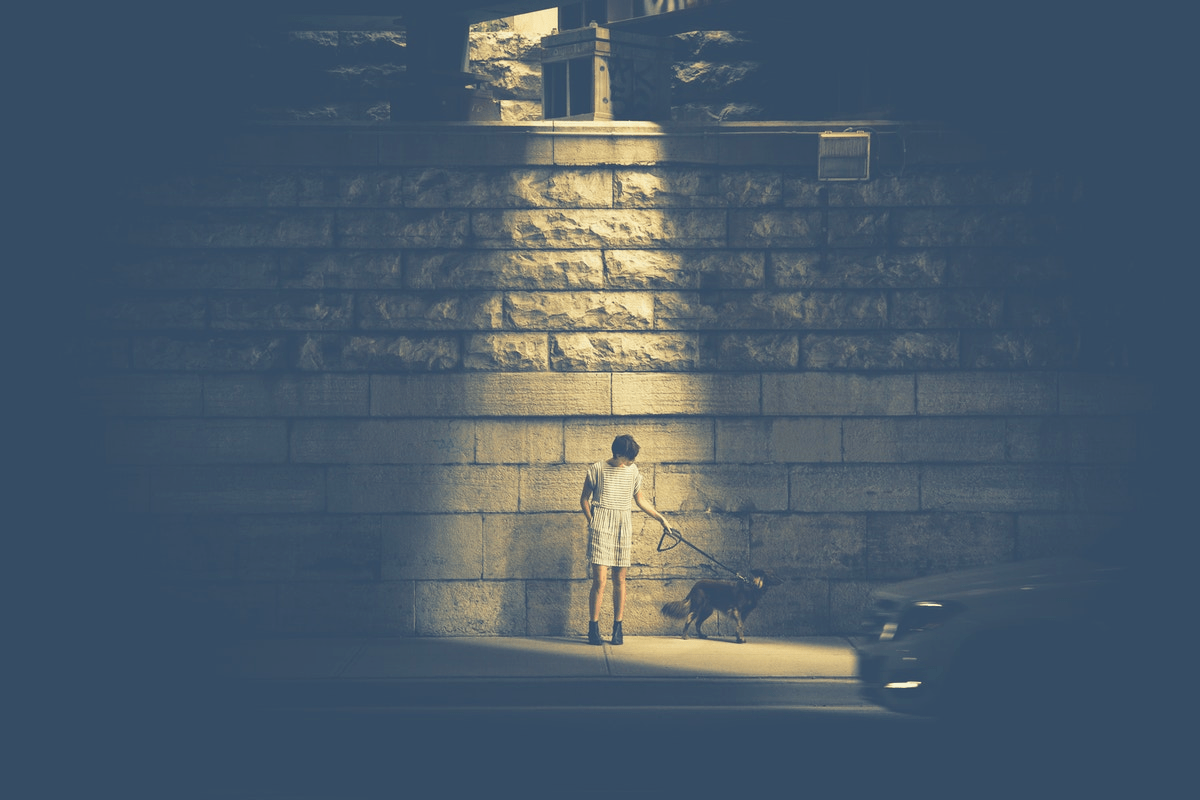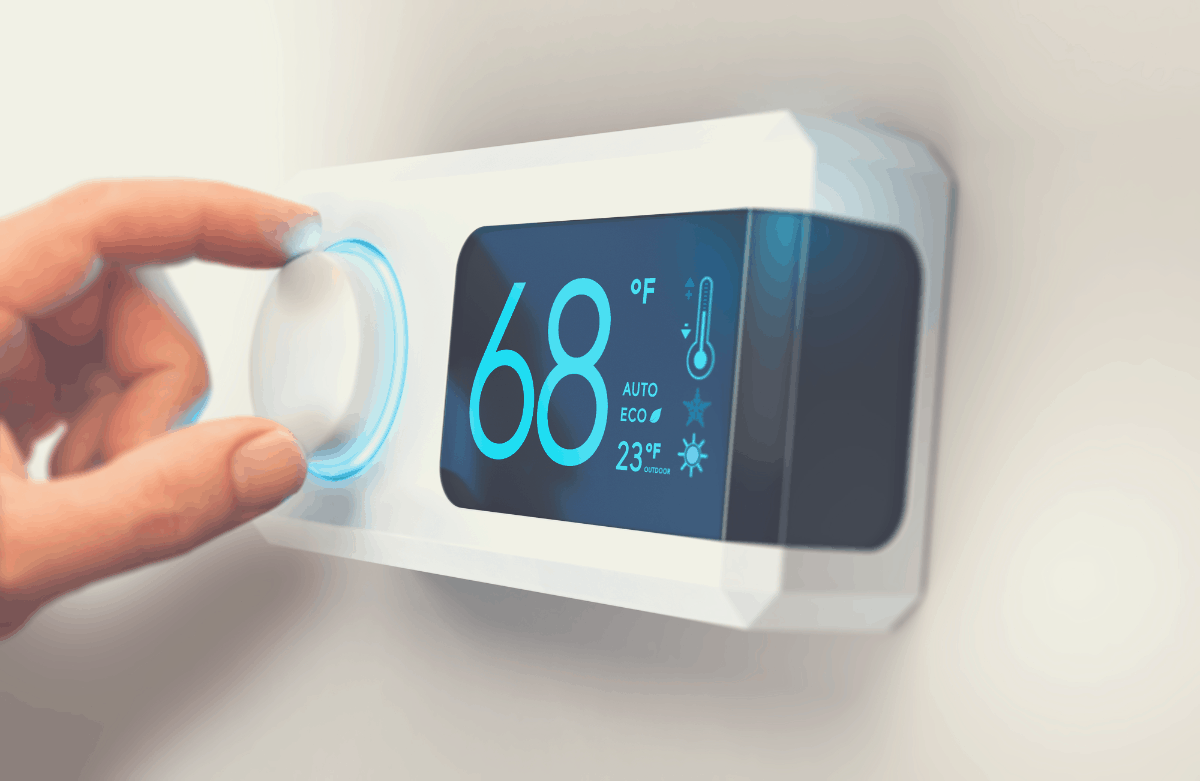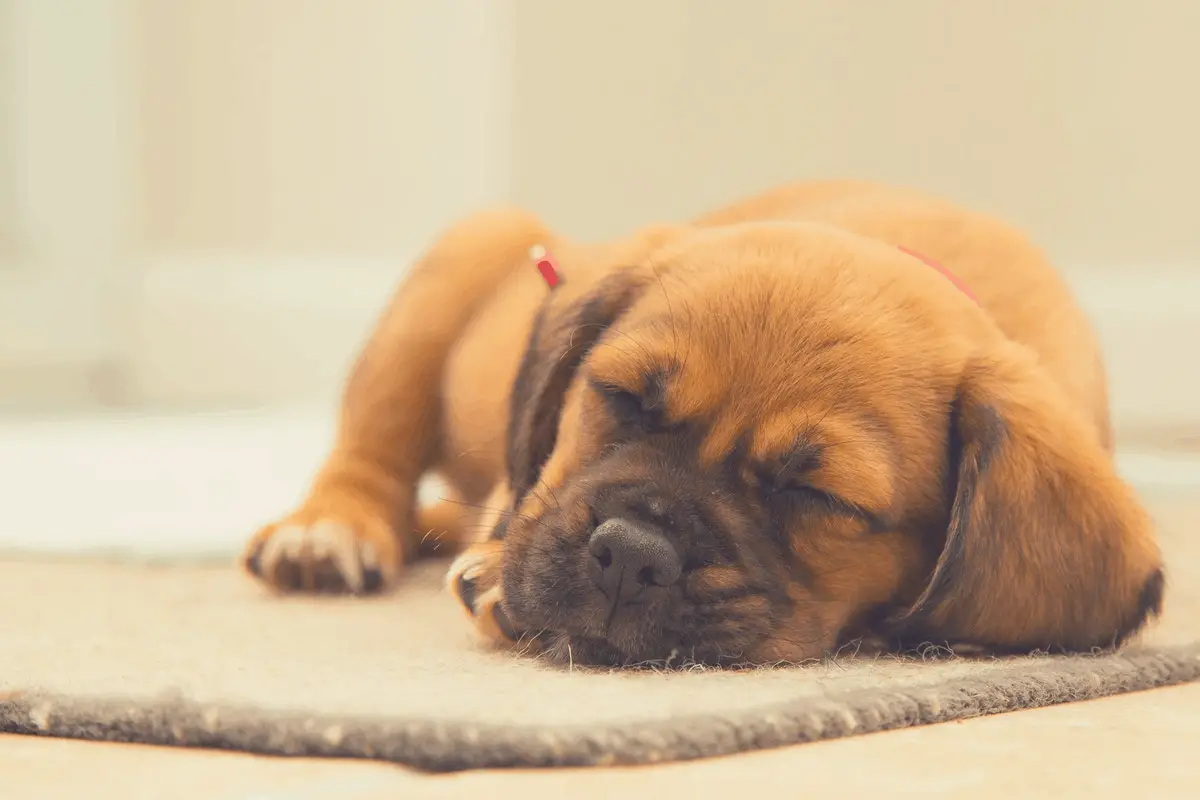Few things can be more adorable than the sight of a puppy napping especially at daytime when you’re more likely to be awake and alert. However, it doesn’t take too long to notice that it is drawing in quick breaths and this can be alarming particularly the first time you witness it.
If you’re an experienced dog owner then chances are you may have witnessed this breathing pattern in the past with another puppy and so may refrain from freaking out.
But many first-timers can get extremely anxious to the point where they may call their Vet or even rush their furry friend to the closest pet clinic.
Why do Puppies Breathe Rapidly In Their Sleep?
Sleep is an important part of any young pooch’s life because it offers benefits ranging from cell regeneration and repair to relaxation. Good slumber also enhances their ability to grow and this is why the majority of puppies get 18-20 hours of shuteye per day.
Have you noticed that humans lose consciousness of their surroundings during the deepest depths of sleep? This phase, popularly known as REM Sleep may be characterized by physical signs such as the rapid movement of the eyes as well as a higher probability of experiencing deep dreams.
Dogs enjoy this state of sleep just like humans and other mammals. They often exhibit physical movements like wriggling, whining, and twitching. Besides, their breathing rates may also become more rapid, especially among puppies.
This is why many veterinarians advise puppy owners not to panic when they spot these signs in their furry friends. In most cases, the puppy’s breathing rate can return to normal immediately after awakening from the deep slumber.
Is it Normal For Puppies to Breathe Fast While Asleep?
The answer is yes. Puppies are biologically wired to breathe faster than older dogs just like other mammals. The average breathing rate for puppies ranges between 10-40 times per minute compared to 10-30 times per minute for older dogs.
Thus, even if you’ve owned an older dog in the past, you could be stunned by the breathing rate of younger pups especially while they’re sleeping. However, this is a completely natural phenomenon that may pose no risk to the young pooch’s life at all.
As long as her breathing rate falls between the range stated above, you can just enjoy the peace and tranquility of watching your best friend sleeping.
How to Determine the Breathing Rate of a Puppy
The breathing rate of any animal is the number of times it inhales and exhales within a minute. Since we already know the healthy breathing rate range for puppies, measuring the specific number of breaths per minute can give you an idea of whether the pup’s breathing rate is within the normal range or not.
Remember, like humans, dogs breathe abnormally fast when extremely tired. If your puppy is currently panting after playing with you all day or engaging in some physical activity, counting its breathing rate at that moment can result in getting the wrong figure.
According to Dr. Marty Becker, a panting dog’s breathing rate can increase by an incredible 1000% from 30-40 breaths per minute to 300-400 breaths per minute.
This is why waiting until a young pooch is completely relaxed or even asleep before trying to count the number of times it breathes is crucial. Here’s a step by step procedure for determining the breathing rate of a puppy:
- Set a timer to 60 seconds
- Monitor the chest moving in and out
- Count each inward and outward movement as a single breath
- Stop counting when the timer ends and write the figure down
- Repeat the process a few times over the next couple of hours
Other Reasons for Rapid Breathing in Dogs
Deep sleep may not be the only cause of heavy breathing in puppies. If your furry friend is experiencing abnormally high rates of inhaling and exhaling then here are a few possible underlying reasons:
1. Panting
As previously discussed, panting may be one of the leading causes of rapid breathing in puppies. These little guys like to play when they’re awake. From chasing other animals to playing with kids and adults, puppies can expend a lot of energy through physical activity.
Fatigue can set in at some point resulting in the need to take extremely quick breaths to restore their oxygen levels to normal. If your pooch is trying to catch some breaths after one type of physical activity or the other, there’s no need to panic.
Remember, the average puppy draws in 300-400 breaths per minute during panting which can be 10 times its normal rate of 30-40 breaths.
However, it is safe to take precautions immediately if you notice a pooch panting without being involved in any physically demanding activity.
Talking to your Vet can be crucial at that point especially if you suspect that the dog may have suffered an injury and displaying additional signs such as restlessness, loss of appetite, enlarged pupils, and anxiety.
Heavy panting can also be a sign that the pup may have been poisoned or suffering from heatstroke. In the case of heatstrokes, finding some shade for the little guy and supplying drinking water can resolve the problem.
2. Illness
Rapid breathing may be a sign of illness in puppies. Remember, pups naturally have fragile immunity levels which can make them prone to diseases and infections.
A swollen tummy is one of the most common signs of disease in young pooches especially during periods when they’re breathing fast.
This symptom could be a sign of a pup’s poor eating habits especially when it eats too quickly and draws in excessive amounts of oxygen in the process. The presence of worms in the tummy can also cause a swollen stomach.
However, these conditions are common among pups so you should chill and relax when you notice them.
Note that not all bloats are normal and if your pup is experiencing signs of zero energy or struggling to eat, this could be indicative of a more serious medical condition. In that case, talking to your Vet as soon as possible may be the way to go.
3. Stress and Anxiety

Extreme levels of stress and anxiety can cause heavy breathing in pups. This is usually common among puppies during their first few days after arriving in your home. While you may be extremely excited about the new addition to the family, it is vital to know that the pup may feel the exact opposite.
Note that bringing a puppy home requires separating it from familiar surroundings into an unfamiliar one. This can result in high levels of anxiety as the little furry friend struggles to get used to the new surroundings.
Besides, it can take some time for a pet owner to establish a bond with a new pup. Until that point arrives, the puppy may show signs such as restlessness and having little interest in its surroundings.
Remember, a new puppy in the home may have just been separated from its parents and siblings. It can take some time before it gets used to being a member of a new family and unfortunately, rapid breathing can be a common sign during that period.
Some pups may also suffer from Cushing’s Syndrome, a medical condition that results in the production of abnormal levels of the hormone Cortisol. Known as the “Stress” hormone, rapid breathing is one of the common signs of the condition.
4. Medical Complications
Is your pup breathing heavier than usual? If yes, it could be a sign of a complicated medical condition. This could range from heart failure to excessive fluid in the chest or lungs as well as lung cancer, pneumonia, and allergies.
These medical complications can lead to severe levels of pain which may cause breathing problems in puppies.
Whatever the underlying condition, taking your pooch to the pet clinic can secure the right treatment to save its life and improve its overall well-being.
5. Car Sickness
Do you frequently drive with the pup in your car for long distances? It is common to see puppies getting car sick and exhibiting signs of rapid breathing. This is simply meant to give you a clue that it is not exactly comfortable riding in the car.
The best way to avoid this is to take proactive steps that can provide more comfort for the young furry animal. If you can minimize the number of rides you take with the pup then that can be a great start.
If not, you should look for ways of distracting the puppy during those rides to minimize its level of anxiety and discomfort.
When to Get Alarmed With a Pup’s Heavy Breathing
As you’re aware by now, more often than not, heavy breathing is a normal condition in pups. Most veterinary doctors recommend the do-nothing approach when a puppy seems fine, stays active and does not show signs of shortness of breath.
However, there are times when seeking urgent veterinary care can be the difference between life and death. If you spot any of these signs in addition to rapid or slow breathing, it is time to walk into a pet clinic:
- Shortness of breath
- Coughing
- Drinking or eating difficulties
- Vomiting
- Diarrhea
- Lack of energy
- Restlessness
Providing First Aid For Dogs With Breathing Problems
If you’ve noticed that your pup’s rapid breathing rate is abnormal, speaking to a Veterinarian or driving to the nearest pet clinic can be a smart move. However, there are a couple of first-aid treatments that can provide some quick relief in the meantime including:
Minimal Stress: Stress and anxiety may be the underlying reasons behind the pup’s abnormal breathing rate. Thus, undertaking measures that can relieve signs of anxiety or at least minimize aggravation can be a timely intervention.
A few ways to do this may include releasing the puppy from its leash and allowing easy movements without restrictions. Finding a noise-free area for the little guy to relax can also be a great idea.
Clear Airways: Abnormal breathing could be a sign that the young pooch is choking. If the puppy seems like it is trying to cough out something, chances are it may be choking. Opening its mouth to look for objects that may be stuck in the throat can help bring out whatever the pup may be choking on. This can provide soothing relief for the beloved little guy.
6 Ways to Improve Puppy’s Comfort During Sleep
Providing your puppy with ss much comfort at night can be a win-win situation for everyone i.e. the pup falls and stays asleep peacefully which may increase the chance of blissful sleeping for everyone else through the night as well.
Here are some of the best ways to supercharge comfort levels at bedtime for your young furry friend.
1. Develop a Routine
Dogs love sleep routines just as much as humans and this is why creating one can be a smart way to put them to bed at night. You can do this by providing dinner around the same time each night and taking it for a short walk an hour or two before tucking it into bed.
Over time, the pup will become used to it and take that as a cue that it is bedtime. If the young furry friend sleeps in your bedroom, switching off the lights at the same time each night can also be a great idea.
2. Potty At Bedtime
Dogs struggle to catch some ZZz with a full bladder so giving the little guy one last opportunity to relieve itself at bedtime can be critical.
This can limit the probability of the puppy waking up in the middle of the night and showing potty clues such as barking, fidgeting, or whimpering.
This can be an important part of the little guy’s sleep routine and may lead to benefits for your sleep.
2. Exercise

Dogs that get lots of exercise during the day end up sleeping better at night. This is because the strain of physical activities on the pooch can help release endorphins that enhance relaxation to promote good sleep at night.
This is why it is crucial to ensure that puppies are as physically active as possible. If you work long hours, try to play with your dog for sometime when you arrive home. Even long brisk walks after dinner help tire it out for a blissful shuteye.
3. Stay Calm at Bedtime
Sure, keeping the puppy active day and night can be a sound idea for superior sleep. However, continuing to play with a pup at bedtime can spike up its anxiety levels which may hinder the ability to rest.
It is advisable to allow your pooch to stay calm for 1-2 hours before its regular bedtime. This should enable a peaceful drifting off into Dreamland.
4. Comfy Dog Crate
Does your pup sleep in a crate? If yes, it is critical to keep it as comfortable as possible if you’re serious about giving it the best rest it can get.
Cold climate residents can achieve this by choosing crates that provide superior warmth. Additionally, introducing accessories such as warm blankets and dog beds especially during winter can enable cozy nighttime rest for your pooch.
I found the Furhaven Therapeutic Sofa-Style Living Room Couch for Dogs on Amazon. It can provide the ultimate relaxation for your favorite pooch. With over 18,000 5-star reviews on Amazon (and counting), it is definitely worth trying.
5. Keep the Crate Close
Keeping the puppy’s crate close can be a smart way to monitor its breathing rate, temperature, and other body conditions especially at night.
Sharing a bedroom with your dog can also offer a sense of familiarity with the pup and lower its anxiety levels.
I keep my pup close in the New World Folding Metal Dog Crate from Amazon. It folds flat for easy portability and ships with a removable plastic composite pan to provide comfort for my little buddy all night long.
6. Monitor the Bedroom Temperature

Monitoring your bedroom temperature especially during the harshest weather conditions can come in handy. Always keep an eye on the thermostat and adjust it accordingly to prevent extreme heat or cold.
In the absence of central air conditioning, opening the bedroom windows and turning on the fan can minimize the summer temperatures meaning more comfort for your pup.
Dog Breeds That Are Prone to Breathing Problems
All dogs can suffer breathing problems due to one reason or the other. However, some breeds may be more prone to the condition more than others. Here are common dog breeds that show signs of rapid breathing and other respiratory problems.
- Yorkshire terriers
- French Bulldogs
- Pugs
- Chihuahuas
Conclusion
It is completely normal for pups to exhibit signs of heavy breathing during sleep. While this can be nerve-wracking for first-time puppy owners, experienced dog breeders, and owners are usually aware of this characteristic.
This is why it is important not to panic just yet especially if you’re sure that the little guy does not have any injuries or suffering from a medical condition that may require urgent attention. It may just be having an enjoyable dream.
However, if the puppy is showing signs of being distressed or ill, calling the Vet right away can be a smart idea.
